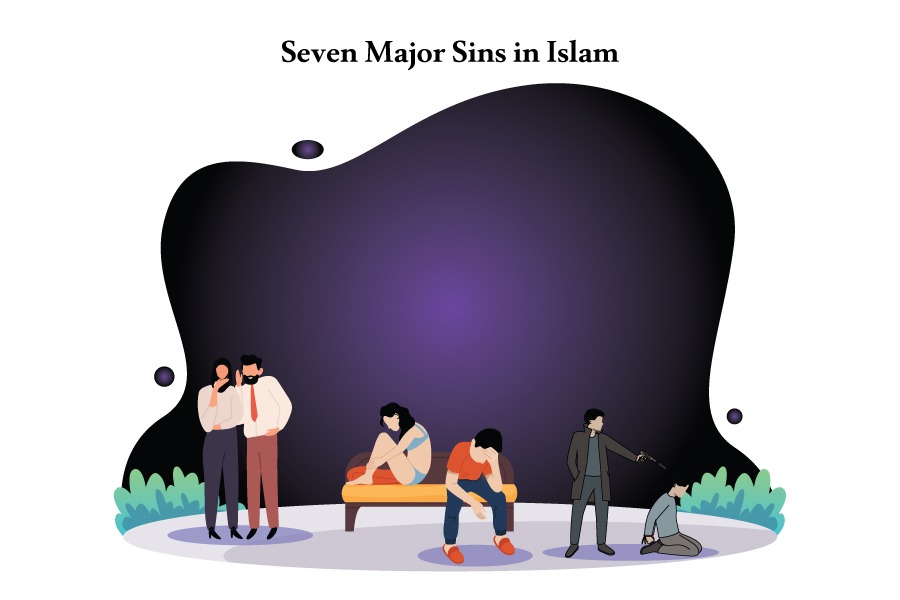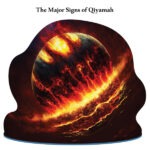Islam is a religion that places great emphasis on living a life that is pleasing to Allah. Central to this goal is the concept of sin. Muslims believe that committing sins violates Allah’s commandments and that such actions lead to negative consequences in this world and the hereafter.
The Concept of Sin in Islam
This article will detail the seven significant sins Allah dislikes and explain why they are considered primary in Islam. The Quran and the Hadith are the primary sources of Islamic teachings that outline these commandments. Muslims define sin as any action that violates Allah’s commandments.
Muslims believe committing sins can have negative consequences in this world and hereafter. However, Muslims also believe that Allah is merciful and forgiving and that repentance can lead to forgiveness.
Seven Deadly Sins in Islam
Muslims refer to the seven significant sins in Islam as the Seven Deadly Sins.
These sins are:
- Shirk – Associating partners with Allah
- Murder
- Fornication and Adultery
- Theft
- Lying and Falsehood
- Backbiting
- Stinginess
Let us explore each of these sins in more detail.
Shirk
Associating Partners with Allah Shirk is the most severe sin in Islam. It involves associating partners or equals to Allah.
In the Quran, Allah states,
إِنَّ ٱللَّهَ لَا يَغْفِرُ أَن يُشْرَكَ بِهِۦ وَيَغْفِرُ مَا دُونَ ذَٰلِكَ لِمَن يَشَآءُ ۚ وَمَن يُشْرِكْ بِٱللَّهِ فَقَدِ ٱفْتَرَىٰٓ إِثْمًا عَظِيمًا
Indeed, Allāh does not forgive association with Him, but He forgives what is less than that for whom He wills. And he who associates others with Allāh has certainly fabricated a tremendous sin.
(AlQuran 4:48)
Committing an act of disbelief is considered unforgivable in Islam unless one repents before death. Muslims believe that Allah is the only God and that associating partners with Him is a grave violation of this belief.
Murder
Killing an innocent human being is also one of the most severe sins in Islam. Allah has clarified that human life is sacred, and taking a life without cause is a major sin.
مِنْ أَجْلِ ذَٰلِكَ كَتَبْنَا عَلَىٰ بَنِىٓ إِسْرَٰٓءِيلَ أَنَّهُۥ مَن قَتَلَ نَفْسًۢا بِغَيْرِ نَفْسٍ أَوْ فَسَادٍ فِى ٱلْأَرْضِ فَكَأَنَّمَا قَتَلَ ٱلنَّاسَ جَمِيعًا
Because of that, We decreed upon the Children of Israel that whoever kills a soul unless for a soul or for corruption [done] in the land – it is as if he had slain mankind entirely.
(AlQuran 5:32)
Muslims believe that all human beings are equal in the eyes of Allah and that taking another’s life violates this belief.
Fornication and Adultery
In Islam, engaging in sexual acts outside marriage is a major sin. Muslims view it as a violation of the sanctity of marriage and a breach of trust. They believe that sexual intimacy should be reserved for marriage and that engaging in sexual acts outside of marriage can harm individuals and society.
ٱلزَّانِيَةُ وَٱلزَّانِى فَٱجْلِدُوا۟ كُلَّ وَٰحِدٍ مِّنْهُمَا مِا۟ئَةَ جَلْدَةٍ ۖ وَلَا تَأْخُذْكُم بِهِمَا رَأْفَةٌ فِى دِينِ ٱللَّهِ إِن كُنتُمْ تُؤْمِنُونَ بِٱللَّهِ وَٱلْيَوْمِ ٱلْءَاخِرِ ۖ وَلْيَشْهَدْ عَذَابَهُمَا طَآئِفَةٌ مِّنَ ٱلْمُؤْمِنِينَ
The [unmarried] woman or [unmarried] man found guilty of sexual intercourse – lash each one of them with a hundred lashes, and do not be taken by pity for them in the religion [i.e., Law] of Allāh, if you should believe in Allāh and the Last Day. And let a group of the Believers witness their punishment.
(AlQuran 24:2)
Theft
Muslims consider stealing from others a major sin in Islam. They view it as a violation of the property rights of others and a breach of trust. Muslims believe that individuals have the right to own property and that stealing from others violates this right.
Lying and Falsehood
In Islam, lying is considered a major sin. Falsehoods can also lead to conflict and misunderstanding. Muslims believe that truthfulness is an essential characteristic of a believer and that lying violates this characteristic.
قُلْ إِنَّ ٱلَّذِينَ يَفْتَرُونَ عَلَى ٱللَّهِ ٱلْكَذِبَ لَا يُفْلِحُونَ
Say, “Indeed, those who invent falsehood about Allāh will not succeed.”
(AlQuran 10:69)
Backbiting
Muslims consider speaking ill of others behind their backs a major sin in Islam. They view it as a violation of the rights of others, and they believe it can harm their reputation and honor. Muslims believe that individuals have the right to their reputation and honor and that backbiting violates this right.
In the Quran, Allah said that backbitting is equal to eat the flesh of his died brother.
يَٰٓأَيُّهَا ٱلَّذِينَ ءَامَنُوا۟ ٱجْتَنِبُوا۟ كَثِيرًا مِّنَ ٱلظَّنِّ إِنَّ بَعْضَ ٱلظَّنِّ إِثْمٌ ۖ وَلَا تَجَسَّسُوا۟ وَلَا يَغْتَب بَّعْضُكُم بَعْضًا ۚ أَيُحِبُّ أَحَدُكُمْ أَن يَأْكُلَ لَحْمَ أَخِيهِ مَيْتًا فَكَرِهْتُمُوهُ ۚ وَٱتَّقُوا۟ ٱللَّهَ ۚ إِنَّ ٱللَّهَ تَوَّابٌ رَّحِيمٌ
O you who have believed, avoid much [negative] assumption. Indeed, some assumption is sin. And do not spy or backbite each other. Would one of you like to eat the flesh of his brother when dead? You would detest it. And fear Allāh; indeed, Allāh is Accepting of repentance and Merciful.
(AlQuran 49:12)
Stinginess
Being miserly and unwilling to give to others in need is also considered a major sin in Islam. Allah has commanded Muslims to be charitable and to help those in need, and failure to do so is seen as a violation of this commandment. Muslims believe that being generous is a virtue and that stinginess.
Conclusion
In conclusion, the seven deadly sins in Islam are considered primary because they are seen as significant violations of Allah’s commandments. These sins can harm individuals and society as a whole, leading to negative consequences both in this world and in the hereafter. Muslims are encouraged to avoid these sins and strive to live a good life for Allah. If one does commit these sins, repentance is always possible, and Allah is merciful and forgiving to those who seek His forgiveness.
As Muslims, we must understand and avoid these Deadly sins. By doing so, we can become better individuals and contribute to the betterment of society. Through self-reflection and striving towards righteousness, we can avoid these sins and earn Allah’s reward in this life and the hereafter. May Allah guide us all to the straight path and help us avoid these significant sins.
Ameen.
















